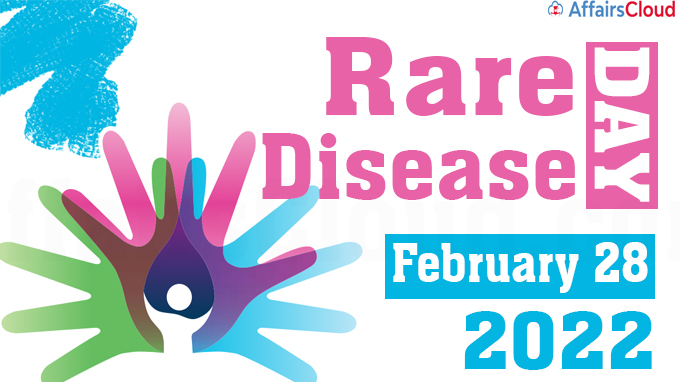 Rare Disease Day is annually observed across the globe on the last day of February (either 28th February or 29th February in case of leap year) to create awareness about rare diseases and ensure access to treatment and medical representation for individuals with rare diseases.
Rare Disease Day is annually observed across the globe on the last day of February (either 28th February or 29th February in case of leap year) to create awareness about rare diseases and ensure access to treatment and medical representation for individuals with rare diseases.
28th February 2022 marks the observance of the 15th edition of Rare Disease Day
- The theme of Rare Disease Day 2022 is “Share Your Colours!”.
Objective:
To achieve equitable access to diagnosis, treatment, health and social care and social opportunity for people affected by a rare disease.
Background:
i.Rare Disease Day was launched by European Organisation for Rare Diseases (EURORDIS) and its Council of National Alliances in 2008.
ii.The first European Rare Disease Day was observed on 29th February 2008.
iii.Following the success of 2008, Rare Disease Day 2009 was celebrated in several countries across the globe.
- February 29, the rarest date which occurs once in 4 years, was chosen for the observance of Rare Disease Day.
EURORDIS-Rare Diseases Europe is a unique, non-profit alliance of 988 rare disease patient organisations from 74 countries that work together to improve the lives of the 30 million people living with a rare disease in Europe.
Events:
Monuments, offices, schools and homes are lit up in the Rare Disease Day colours – green, blue, purple and pink, to raise awareness for the 300 million people living with a rare disease and their families.
What are Rare Diseases?
i.A disease or disorder is defined as rare when it affects fewer than 1 in 2000 people and there are more than 6000 rare diseases.
ii.“Orphan drugs” are medicinal products that are intended for the diagnosis, prevention or treatment of life-threatening or very serious diseases or disorders that are rare.
India’s Policies on Rare Diseases:
i.In 2021, then Health Minister Dr Harsh Vardhan approved the “National Policy for Rare Diseases 2021” which aims to lower the high cost of treatment for rare diseases with an increased focus on indigenous research.
ii.In 2017, the Ministry of Health and Family Welfare (MoHFW) formulated the National Policy for Treatment of Rare Diseases (NPTRD) that aims at lowering the incidence and prevalence of rare diseases based on an integrated and comprehensive preventive strategy encompassing awareness generation, premarital, post-marital, pre-conception and post-conception screening and counselling programmes to prevent births of children with rare diseases.




